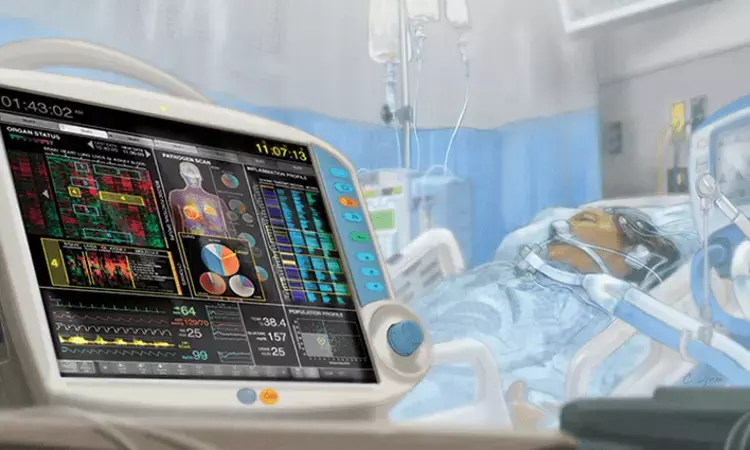- Home
- Medical news & Guidelines
- Anesthesiology
- Cardiology and CTVS
- Critical Care
- Dentistry
- Dermatology
- Diabetes and Endocrinology
- ENT
- Gastroenterology
- Medicine
- Nephrology
- Neurology
- Obstretics-Gynaecology
- Oncology
- Ophthalmology
- Orthopaedics
- Pediatrics-Neonatology
- Psychiatry
- Pulmonology
- Radiology
- Surgery
- Urology
- Laboratory Medicine
- Diet
- Nursing
- Paramedical
- Physiotherapy
- Health news
- Fact Check
- Bone Health Fact Check
- Brain Health Fact Check
- Cancer Related Fact Check
- Child Care Fact Check
- Dental and oral health fact check
- Diabetes and metabolic health fact check
- Diet and Nutrition Fact Check
- Eye and ENT Care Fact Check
- Fitness fact check
- Gut health fact check
- Heart health fact check
- Kidney health fact check
- Medical education fact check
- Men's health fact check
- Respiratory fact check
- Skin and hair care fact check
- Vaccine and Immunization fact check
- Women's health fact check
- AYUSH
- State News
- Andaman and Nicobar Islands
- Andhra Pradesh
- Arunachal Pradesh
- Assam
- Bihar
- Chandigarh
- Chattisgarh
- Dadra and Nagar Haveli
- Daman and Diu
- Delhi
- Goa
- Gujarat
- Haryana
- Himachal Pradesh
- Jammu & Kashmir
- Jharkhand
- Karnataka
- Kerala
- Ladakh
- Lakshadweep
- Madhya Pradesh
- Maharashtra
- Manipur
- Meghalaya
- Mizoram
- Nagaland
- Odisha
- Puducherry
- Punjab
- Rajasthan
- Sikkim
- Tamil Nadu
- Telangana
- Tripura
- Uttar Pradesh
- Uttrakhand
- West Bengal
- Medical Education
- Industry
Serial microalbuminuria analysis in sepsis patients helps identify those requiring early treatment

Jaipur, Rajasthan: A new study published in the Journal of the Association of Physicians of India suggests that serial bedside urine albumin-creatinine analysis may aid in the early identification of individuals with sepsis who require early targeted treatment.
Despite breakthroughs in medical therapies, sepsis remains a significant healthcare risk in India and throughout the world. Because of the frequent delays in diagnosis, tailored medicines are less successful. There is no conventional strategy for detecting sepsis early in severely unwell individuals.
As a result, CL Nawal and colleagues undertook this study with the goal of determining the difference in microalbuminuria levels between sepsis and non-sepsis individuals. The decrease in levels over the first 24 hours was also compared to two sepsis scores, APACHE II (Acute Physiology and Chronic Health Evaluation) and SOFA (Sequential Organ Failure Assessment), for morbidity and death prediction.
In this study, 150 patients were included, with 75 patients from each sepsis and non-sepsis group admitted to the Medical Intensive Care Unit (ICU). Microalbuminuria levels were measured upon admission and 24 hours later.
The key findings of this study were as follows:
1. Microalbuminuria levels were substantially higher in sepsis patients than in non-sepsis patients.
2. In comparison to APACHE II and SOFA scores, microalbuminuria had the greatest sensitivity of 90% and specificity of 98% for distinguishing between sepsis and non-sepsis.
3. In terms of mortality, group A had 24 deaths out of 75 patients, whereas group B had only 15 deaths out of 75 patients.
In conclusion, this study suggests many possible applications for microalbuminuria monitoring in the severely unwell. Serial bedside urine albumin-creatinine measurement may aid in the early identification of individuals with sepsis who require early targeted treatment. The 24-hour ACR evaluation predicts ICU survival and has the ability to evaluate the success of therapeutic measures such as fluid resuscitation, suitable antibiotics, vasopressors, and endothelium-affecting inotropes.
Reference:
Nawal CL, Barasara S, Chejara RS, Meena PD, Singh A, Meena VK. Microalbuminuria: As an Indicator of Sepsis and to Predict Mortality in Patients Admitted to Intensive Care Unit. J Assoc Physicians India. 2022 Mar;70(3):11-12. PMID: 35438283.
Neuroscience Masters graduate
Jacinthlyn Sylvia, a Neuroscience Master's graduate from Chennai has worked extensively in deciphering the neurobiology of cognition and motor control in aging. She also has spread-out exposure to Neurosurgery from her Bachelor’s. She is currently involved in active Neuro-Oncology research. She is an upcoming neuroscientist with a fiery passion for writing. Her news cover at Medical Dialogues feature recent discoveries and updates from the healthcare and biomedical research fields. She can be reached at editorial@medicaldialogues.in
Dr Kamal Kant Kohli-MBBS, DTCD- a chest specialist with more than 30 years of practice and a flair for writing clinical articles, Dr Kamal Kant Kohli joined Medical Dialogues as a Chief Editor of Medical News. Besides writing articles, as an editor, he proofreads and verifies all the medical content published on Medical Dialogues including those coming from journals, studies,medical conferences,guidelines etc. Email: drkohli@medicaldialogues.in. Contact no. 011-43720751


